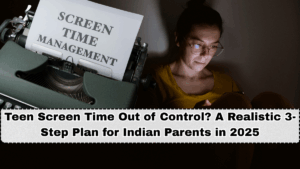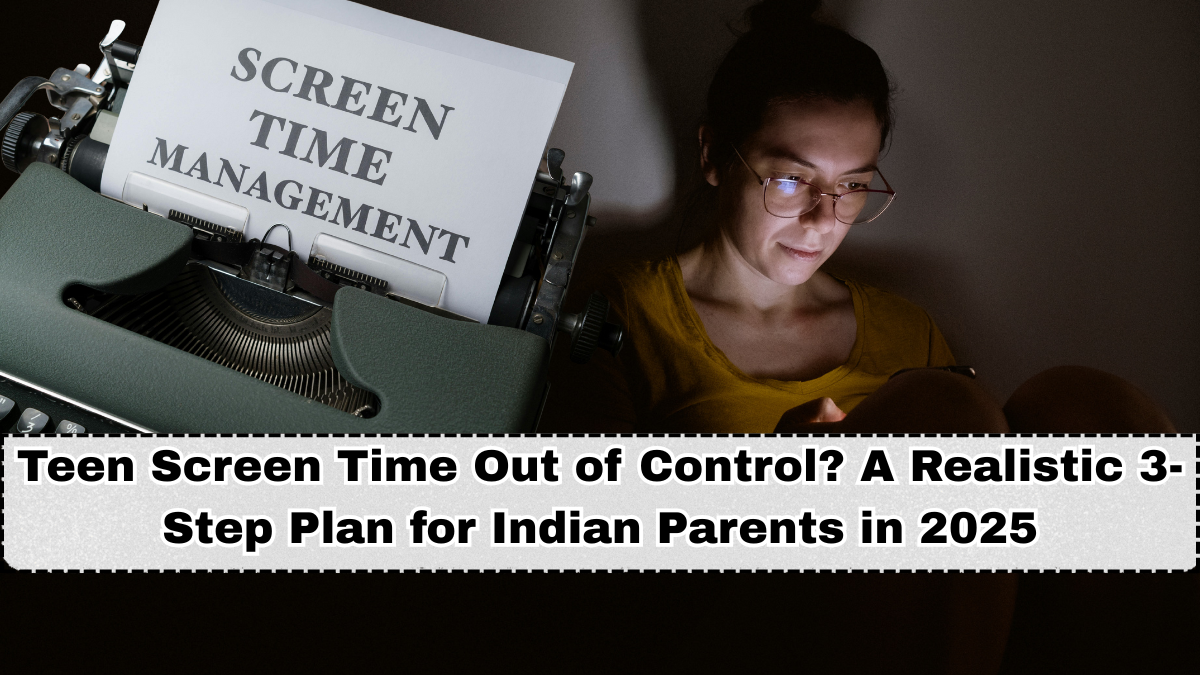In 2025, Indian parents are facing a digital challenge they never imagined—teens spending 3 to 5 hours daily on reels, YouTube, OTT content and social media. The Teen screen time India parents guide conversation is becoming urgent because teenagers are more exposed than ever to algorithm-driven content loops, endless scrolling and dopamine-heavy short videos. What parents once considered “normal entertainment” has turned into compulsive behaviour affecting academics, focus, mood and even family relationships. But the key insight experts emphasise is this: you can’t fight teen screen addiction with shouting, sudden bans or guilt. You need realistic, psychology-backed strategies that teenagers will actually follow.
The Kantar Digital Behaviour Study 2025 confirms that Indian teens consume the highest number of short-form videos in Asia. Reels, shorts, gaming streams and binge culture have become the standard after-school routine. Teenagers use screens not just for entertainment but for social status, identity expression, relaxation and escapism. This is why parents often feel helpless when their child refuses to reduce screen time. But with a structured approach, emotional understanding and calm boundaries, families can take back control—without damaging trust.

Why Teen Screen Addiction Is Harder to Manage Than Younger Kids
Teenagers are in a unique developmental phase—they crave independence but still lack full emotional regulation. That makes screen time a tempting escape. Unlike small children, teens often use screens to cope with academic pressure, FOMO, relationship stress, insecurity, boredom and lack of offline hobbies. This complex emotional link is why ordinary rules don’t work.
Parents trying to restrict screen time often face:
• “Everyone is online, why can’t I?”
• “This is how I relax!”
• “You don’t understand anything.”
• “I just need 10 more minutes.”
These responses feel rude—but they’re normal psychological reactions. The Teen screen time India parents guide trend focuses on working with a teen’s mindset, not against it.
The Real Problem: It’s Not Screen Time, It’s Screen Compulsion
Experts now differentiate between screen usage and screen dependence. Teenagers today are not just watching—they’re compulsively checking for notifications, unlocking phones every few minutes, and consuming content endlessly without intention. This compulsive loop affects:
• sleep cycles
• attention span
• academic performance
• mood stability
• self-esteem
• physical health
Indian teens are also experiencing higher stress and comparison anxiety because of influencer culture. So the goal isn’t zero screens—it’s mindful screens.
A Realistic 3-Step Plan That Actually Works for Indian Parents
Most screen detox plans fail because they are too strict or unrealistic. Teenagers respond best to routines they help design. This 3-step plan, recommended by therapists and digital-wellbeing experts in India, works across most families.
Step 1: Set a Mutually Agreed Screen Routine (Not a Dictated One)
Teenagers hate rules imposed on them—but they follow rules they co-create. Sit with your teen and plan screen hours together:
• 1–1.5 hours for entertainment
• 30–45 minutes for social media
• No screens during meals
• No screens 1 hour before bed
Ask them to choose the specific slots (example: 6–7 pm or 9–10 pm). They feel more in control, and this increases cooperation.
Avoid saying:
“From today, no more reels!”
Say instead:
“Let’s decide a routine that works for both of us.”
This simple psychological shift changes everything.
Step 2: Replace Late-Night Screen Use With a Better Habit
Most harmful screen usage happens after 9 pm. Teens often lie awake watching reels or chatting because it gives them privacy and a sense of connection. Instead of banning the phone, replace the habit:
• Switch to reading for 10 minutes
• Journaling
• Listening to soft music
• Light stretching
• Family talk time
• Evening walk
When teens feel emotionally supported, they depend less on their phones for comfort.
Step 3: Introduce Weekly Digital Detox Windows (Not Daily Battles)
Daily strict limits cause fights. But weekly detox windows are easier:
• 2–3 hours on Sunday
• 1 family outing
• Board games or cooking
• Visiting cousins or friends
• Quick outdoor activity
These detox windows reset the brain and reduce compulsive scrolling. Over time, you’ll notice teens naturally reduce screen dependence during weekdays.
This is the heart of the Teen screen time India parents guide—consistency without conflict.
How Parents Can Build Trust While Reducing Screen Time
Teenagers disconnect when they feel judged. Use supportive communication:
• “I’m worried about your sleep, not your phone.”
• “Tell me what you enjoy watching—I actually want to understand.”
• “Let’s find a balance where you feel good and healthy.”
This builds trust and prevents rebellion. Many teens open up emotionally when parents show curiosity instead of criticism.
Also, parents must model good digital habits. Teens won’t follow rules if parents themselves are scrolling during family time.
Signs Your Teen Is Already Overusing Screens
Watch out for these subtle red flags:
• falling grades
• late-night wakefulness
• morning fatigue
• irritability on non-screen days
• difficulty concentrating
• skipping activities to watch videos
• compulsive phone checking every few minutes
These behaviours indicate early dependence that requires timely intervention.
What If Your Teen Still Doesn’t Listen?
Don’t panic. Small steps help:
• Use apps that track usage instead of blocking
• Encourage one offline hobby
• Reduce pressure—stress drives screen addiction
• Praise improvements, even small ones
• Make screen time a shared activity instead of a secret one
Emotional safety motivates behaviour change more than strict rules.
FAQs
How many hours of screen time is okay for teens?
Around 2 hours of entertainment screens per day, excluding schoolwork, is considered safe.
Is late-night phone usage harmful?
Yes, it disrupts sleep, lowers focus, worsens mood and increases addiction risk.
What is the biggest cause of teen screen addiction?
Stress, boredom, lack of hobbies and the dopamine rewards from short-form content.
Should parents use parental-control apps?
Use them for monitoring, not punishment. Open communication works better.
Can teens recover from screen addiction?
Yes—consistent routines, healthier alternatives and emotional support make full recovery possible.
Click here to know more.
